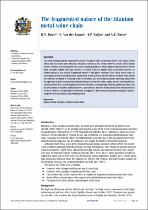JavaScript is disabled for your browser. Some features of this site may not work without it.
- ResearchSpace
- →
- Research Publications/Outputs
- →
- Journal Articles
- →
- View Item
| dc.contributor.author |
Roux, Rina N

|
|
| dc.contributor.author |
Van der Lingen, E

|
|
| dc.contributor.author |
Botha, AP

|
|
| dc.contributor.author |
Botes, AE

|
|
| dc.date.accessioned | 2023-02-26T20:29:46Z | |
| dc.date.available | 2023-02-26T20:29:46Z | |
| dc.date.issued | 2020-11 | |
| dc.identifier.citation | Roux, R.N., Van der Lingen, E., Botha, A. & Botes, A. 2020. The fragmented nature of the titanium metal value chain. <i>Journal of the Southern African Institute of Mining and Metallurgy, 120(11).</i> http://hdl.handle.net/10204/12636 | en_ZA |
| dc.identifier.issn | 2411-9717 | |
| dc.identifier.issn | 2225-6253 | |
| dc.identifier.uri | http://dx.doi.org/10.17159/2411-9717/1126/2020 | |
| dc.identifier.uri | http://hdl.handle.net/10204/12636 | |
| dc.description.abstract | This study investigates the fragmented nature of the global and local titanium metal value chains. South Africa has the fourth most abundant titanium reserves in the world. However, South Africa mainly exports titanium ore and imports value-added titanium products, which impacts the potential to derive more economic benefit from this resource. For South Africa to benefit from its titanium reserves, an understanding of the current fragmented nature of the global titanium value chain would assist in entering the global titanium industry. Information on the global and South African titanium value chains was collected by means of a desktop study. It was found that the leading countries operating within both the upstream and the downstream titanium industry are the USA, China, Japan, Russia, and Kazakhstan. The key drivers that caused fragmentation were identified as technology, markets, production costs, and the availability of titanium mineral reserves. An important outcome of this study is the identification of the local need for a technological foundation in support of downstream titanium processing to market-competitive titanium mill and powder products. | en_US |
| dc.format | Fulltext | en_US |
| dc.language.iso | en | en_US |
| dc.relation.uri | http://www.scielo.org.za/scielo.php?script=sci_arttext&pid=S2225-62532020001100007&lng=en&nrm=iso&tlng=en | en_US |
| dc.source | Journal of the Southern African Institute of Mining and Metallurgy, 120(11) | en_US |
| dc.subject | Fragmentation | en_US |
| dc.subject | Titanium | en_US |
| dc.subject | Titanium value chain | en_US |
| dc.title | The fragmented nature of the titanium metal value chain | en_US |
| dc.type | Article | en_US |
| dc.description.pages | 633–640 | en_US |
| dc.description.note | All the contents of this journal, except where otherwise noted, is licensed under a Creative Commons Attribution License | en_US |
| dc.description.cluster | Manufacturing | en_US |
| dc.description.impactarea | AISI | en_US |
| dc.identifier.apacitation | Roux, R. N., Van der Lingen, E., Botha, A., & Botes, A. (2020). The fragmented nature of the titanium metal value chain. <i>Journal of the Southern African Institute of Mining and Metallurgy, 120(11)</i>, http://hdl.handle.net/10204/12636 | en_ZA |
| dc.identifier.chicagocitation | Roux, Rina N, E Van der Lingen, AP Botha, and AE Botes "The fragmented nature of the titanium metal value chain." <i>Journal of the Southern African Institute of Mining and Metallurgy, 120(11)</i> (2020) http://hdl.handle.net/10204/12636 | en_ZA |
| dc.identifier.vancouvercitation | Roux RN, Van der Lingen E, Botha A, Botes A. The fragmented nature of the titanium metal value chain. Journal of the Southern African Institute of Mining and Metallurgy, 120(11). 2020; http://hdl.handle.net/10204/12636. | en_ZA |
| dc.identifier.ris | TY - Article AU - Roux, Rina N AU - Van der Lingen, E AU - Botha, AP AU - Botes, AE AB - This study investigates the fragmented nature of the global and local titanium metal value chains. South Africa has the fourth most abundant titanium reserves in the world. However, South Africa mainly exports titanium ore and imports value-added titanium products, which impacts the potential to derive more economic benefit from this resource. For South Africa to benefit from its titanium reserves, an understanding of the current fragmented nature of the global titanium value chain would assist in entering the global titanium industry. Information on the global and South African titanium value chains was collected by means of a desktop study. It was found that the leading countries operating within both the upstream and the downstream titanium industry are the USA, China, Japan, Russia, and Kazakhstan. The key drivers that caused fragmentation were identified as technology, markets, production costs, and the availability of titanium mineral reserves. An important outcome of this study is the identification of the local need for a technological foundation in support of downstream titanium processing to market-competitive titanium mill and powder products. DA - 2020-11 DB - ResearchSpace DO - 10.17159/2411-9717/1126/2020 DP - CSIR J1 - Journal of the Southern African Institute of Mining and Metallurgy, 120(11) KW - Fragmentation KW - Titanium KW - Titanium value chain LK - https://researchspace.csir.co.za PY - 2020 SM - 2411-9717 SM - 2225-6253 T1 - The fragmented nature of the titanium metal value chain TI - The fragmented nature of the titanium metal value chain UR - http://hdl.handle.net/10204/12636 ER - | en_ZA |
| dc.identifier.worklist | 24179 | en_US |






